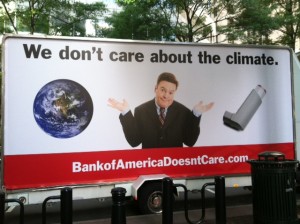
I’m in Charlotte this week to talk to Bank of America’s annual shareholder meeting. For the past two years, RAN has been calling on the bank to get serious about addressing climate change.This is a bank that declares a “commitment to positive environmental change” proudly on its website and a bank that has fanfared multi-billion dollar climate initiatives. However, the bank is also the leading underwriter of the U.S. coal industry, the single largest source of U.S. climate emissions. This means that bank of America is actually underwriting the climate change that it claims to want to tackle. The sad truth is that it is not possible for a bank to be both #1 in addressing climate change and #1 in financing the coal sector. These two goals are simply incompatible. I’ve been terrified about what we’re doing to the climate for at least ten years, but the past 12 months of extreme weather event has underlined the reality of climate change and the urgent need for action. From Superstorm Sandy’s devastation on the eastern seaboard, to the droughts endured by the Midwest and Plains states, and the wildfires that raged across the Rocky Mountains last summer, the planet is sending us a loud and clear message that it’s in distress. These were major headline stories, but the impacts were truly felt everywhere: over the year, more than 69,000 local heat records were set. Even as I type these words, communities in North Charlotte are being evacuated due to flooding from weeks of heavy rain. I’m joined here in Charlotte by more than 30 friends and allies, each with a personal reason for coming to talk to Bank of America (BofA) about climate change. This morning we held a press conference and I stood with Indian campaigner, Ashish Fernandes. Ashish spoke about the devastating impacts that BofA-funded coal mining companies have on his country’s biodiversity, water supplies and indigenous communities. We stood with Barbara Gottlieb of Physicians for Social Responsibility, who explained the serious health impacts of climate change and burning coal; these include strokes, asthma and malnutrition. We stood with Oregonian Jim Plunkett, who is fighting plans to build five new coal export terminals in the Pacific North West, and we stood with local Charlotte Pastor, Nancy Allison, who spoke to our moral imperative to protect the climate for future generations. Tomorrow we’ll take our message directly to BofA’s CEO Brian Moynihan, to their Board of Directors and to the bank’s shareholders. We will ask the bank to stop hedging and make a firm choice: Will the bank continue to fund climate chaos and community devastation, or will the bank fund a clean energy future?